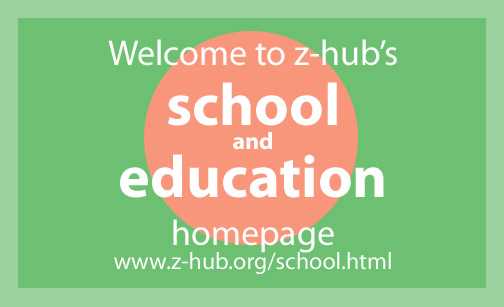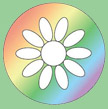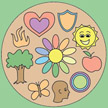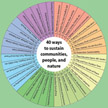Contact Zoe Elrick z.hub.garden@gmail.com for speaking, consulting, ABC education lessons, and outdoor classroom design, on the ABC Garden and the ABCs of Community Education.
ABCs of Education
ABCs of Community Education

ABCs of Education.
Start Simple and Small;
later, gradually get more Complex and Bigger.
Do this not only for academics;
but also, for community, ecology, economy, and technology, and more.
The ABCs and steps 1, 2, 3 are the simple, small, early steps in learning something. The ABCs of academics includes learning to count from 1 to 20, to add 1-digit numbers, to sing the alphabet, and to read simple, small 3-letter words. The ABCs on how to participate in a community, connect with nature, boost the economy, and diminish poverty includes making simple, small, basic stuff that is vital to communities as well as to the lives of individual people. The basic stuff is stuff needed by all people: rich people, poor people, primitive caveman, and the modern city slicker alike. The basic stuff includes housing, water, and food. Every student (primitive and modern) should spend at least a little time on the ABCs of community and economy, which is to handmake primitive stone-age low-tech stuff from scratch from nature. People, who truly understand the core and fundamentals of community and economics, are only the people, who have a basic in-depth knowledge of local nature (ecology) plus at least a little experience in doing for themselves some gathering and handmaking stuff from scratch from nature. Like people cannot do algebra if they cannot count from 1 to 20 and beyond, people cannot help to run a larger society and complex economy, if they haven't hands-on done the ABCs of community education, the basic economic steps from 1 to 20 within a simple, small community, such as an ABC Garden.
Read more about the
ABCs of Community Education.
Contact Zoe Elrick z.hub.garden@gmail.com for speaking, consulting, ABC education lessons, and outdoor classroom design, on the ABC Garden and the ABCs of Community Education.
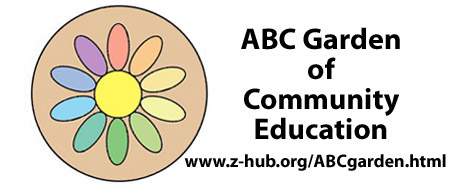
● ABC Garden
of Community Education
ABC Education Garden of Three Oaks, Michigan, USA. See some of the class lessons learned at the ABC garden.
See ABC Garden
at www.z-hub.org/ABCgarden.html

● Pocket Pumpkin Press
Offers sustainable community and nature curricula, education materials, and resources.
Offers ABC Garden of Community Education curricula.
Offers science, social studies, ecology, economy curricula, worksheets, textbooks, posters, and more. Offers place-based curricula on local nature and the local community.
See Pocket Pumpkin Press
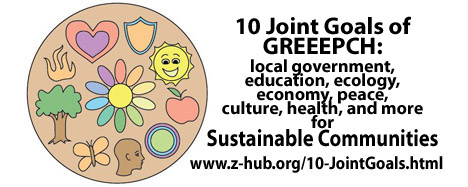
● 10 Goals and Success Indicators of education and other agencies of GREEEPCH: goverment, routine daily work and business, education, ecology, economy, peace, culture, and health.
The 10 Joint Goals are to help communities to achieve the following
to become Sustainable Communities.
1. peace: morals-love-awareness-health-safety
2. protection: sustaining 16 priceless things
3. plaza: education space: ABC Garden
4. play and fun: outdoor time
5. no-poverty: plush local economies
6. palleee: functional community with EEE system
7. probing: community education
8. parks and pastures: local ecology
9. plait: holistic: sci-art-eco-eco
10. energy
Read descriptions of the 10 Joint Goals.
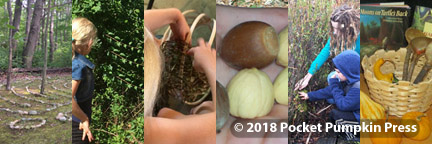
● Holistic Community Education.
(a.k.a. Holistic Education or Community Education)
(a.k.a. 18 Multiple Intelligences)
The wisest education is a holistic sustainable community education to learn (study and experience) how to live, learn, and work to help communities, people, and nature, by doing the following 18 holistic education skills and subjects. In holistic education, every subject is interdisciplinary. Each subject relates to the other holistic subjects, to academic subjects, as well as to local and global issues.
Read more about holistic community education.
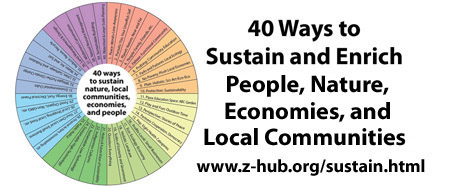
● Holistic Sustainability
being environmental, sustainable education,
Schools and students should study the ...
40 Sustainable Categories
Let's sustain and enrich communities, people, and nature. Let's have an education that teaches students how to run sustainable communities and an economy that are mutually beneficial to both people and nature.
Here are a few of the 40 categories:
1. Peace: Morals-Love-Awareness-Health-Safety
2. Pursuits: You, Your Unselfish Self
3. Planet: Nature, Near and Far
4. People: Family, Friends, etc.
5. Palleee: Functional Community
6. Probing: Community Education
7. Parks and Pastures: Local Ecology
8. No-Poverty: Plush Local Economies
9. Plait: Holistic: Sci-Art-Eco-Eco
10. Protection: Sustainability
11. Plaza: Education Space: ABC Garden
12. Play and Fun: Outdoor Time
13. Perspective: Stories of Peace
14. Partners: Cooperation, Democracy
15. Pep: Eight Health Categories
16. Profits-Local: Small Businesses
17. Eco: Ecology-Economy
18. Land: Holistic Landcare
23. Low-Tech: Sustainable Technologies
24. High-Tech: Sustainable Technologies
35. RRR: Reduce, Reuse, Recycle
37. Wilderness: Conservation
Read more about holistic sustainability.

● Schools and students should study
Morals and 5 Ways to be Nice.
We implement the ABC Holistic Education Garden to teach children how to be moral: to do good, sustainable, and holistic things for communities, people, and nature. Also, garden lessons include learning how to be nice in 5 ways. It's important for each person to be nice in all 5 ways.
1. Friendly to People
2. Unprejudiced
3. Friendly to Nature
4. Help Individuals in Occasional Emergencies Help Individuals (people, animals, plants, etc.), Random Acts of Kindness, Save a Life, etc.
5. Community Help, Holistically Help Communities via Community Cooperation to run a community and its EEE System. Boost quality of life. Sustain and enrich the community. Improve the economy in the long-run. Diminish poverty.
Read more about Morals and 5 Ways to be Nice.
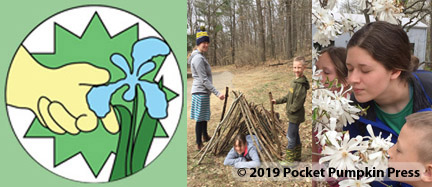
Galien Valley Nature and Culture Program (GV-NCP).
Galien Valley Nature and Culture Program runs interdisicplinary classes about nature and culture. Classes are informative and fun. Students learn how culture and nature relate to each other and how science, art, health, economy, etc. relate to nature too. Furthermore, classes include a few lessons on holistic skills as well as the ABCs of community, ecology, economy, science, art, and more.
See Galien Valley Nature and Culture Program website at www.z-hub.org/galienvalleyncp.html
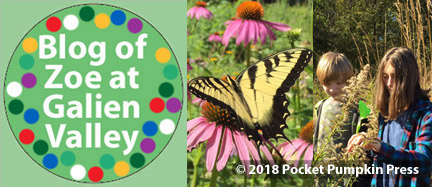
Blog of Zoe at Galien Valley, about nature and Zoe teaching community education, science, art, teaching nature classes and the ABCs of community, science, art, local wildlife, local native flowers, stewardship and landcare of local habitats, etc.
● Zoe's Daily Blog
www.z-hub.org/zle-blog.html
● Zoe's Monthly Blog
zoemonthlyblog.blogspot.com
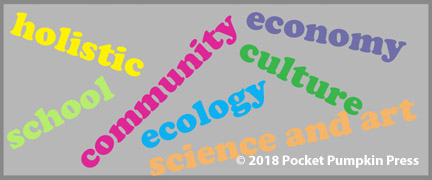
● Language, words re-defined
www.z-hub.org/zle-blog/definitionz.html
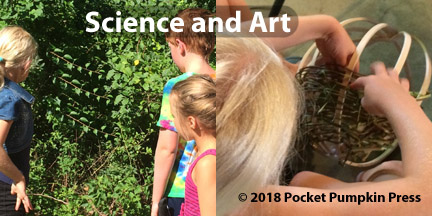
● Science and Art
www.z-hub.org/school/sci-art.html
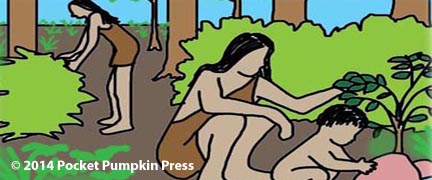
● History, Present, Future
www.z-hub.org/school/history.html
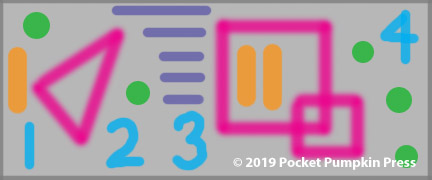
● Math
www.z-hub.org/school/math.html
● More Information on education
● How do people define words?
40 Ways Community Schools are beneficial
40 Ways Modern Public Schools are harmful
